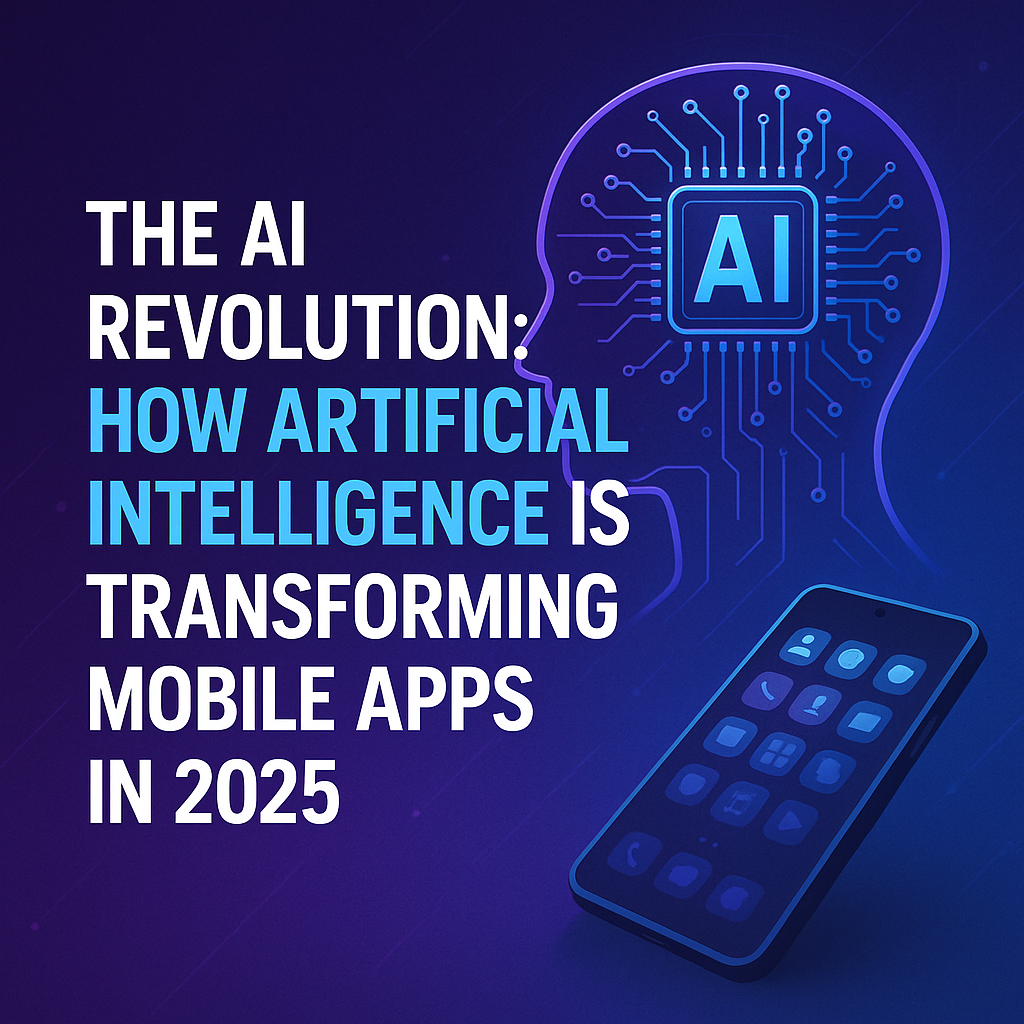The mobile app landscape is undergoing a seismic shift, driven by the rapid advancement of artificial intelligence technologies. As we move through 2025, AI is no longer just a buzzword—it's a fundamental component that's reshaping how we design, develop, and interact with mobile applications.

AI is revolutionizing the mobile app ecosystem
The Current State of AI in Mobile Development
Today's mobile apps are smarter than ever before. From personalized recommendations to predictive text, AI has become so seamlessly integrated that users often don't realize they're interacting with artificial intelligence. But what we're seeing now is just the beginning.
According to recent industry reports, over 70% of mobile apps now incorporate some form of AI functionality, whether it's machine learning algorithms for user behavior analysis or natural language processing for voice commands. This represents a 250% increase from just three years ago.
Key Statistics:
- 87% of users prefer apps with AI-powered personalization
- AI-integrated apps see 3x higher user retention rates
- Mobile AI market expected to reach $37.8 billion by 2026
Game-Changing AI Technologies in Mobile Apps
1. Advanced Natural Language Processing (NLP)
Natural Language Processing has evolved dramatically. Modern NLP systems can understand context, emotion, and even cultural nuances. This has revolutionized how users interact with mobile apps through:
- Conversational AI: Chatbots that can handle complex queries and provide human-like responses
- Real-time Translation: Breaking down language barriers with instant, accurate translations
- Voice-First Interfaces: Apps that can be fully controlled through natural speech
2. Computer Vision and Image Recognition
The camera has become one of the most powerful AI tools in mobile devices. Modern computer vision capabilities include:
- Augmented Reality (AR): Overlaying digital information on the real world
- Visual Search: Finding products or information by simply pointing the camera
- Facial Recognition: Enhanced security and personalized experiences
- Medical Diagnostics: Apps that can identify skin conditions or analyze medical images
// Example: Implementing basic image recognition in iOS
import CoreML
import Vision
func detectObjects(in image: UIImage) {
guard let model = try? VNCoreMLModel(for: YourMLModel().model) else {
return
}
let request = VNCoreMLRequest(model: model) { request, error in
guard let results = request.results as? [VNClassificationObservation] else {
return
}
// Process detected objects
for classification in results {
print("Detected: \(classification.identifier) - Confidence: \(classification.confidence)")
}
}
// Perform the request
let handler = VNImageRequestHandler(cgImage: image.cgImage!)
try? handler.perform([request])
}
3. Predictive Analytics and Personalization
AI algorithms analyze user behavior patterns to predict future actions and preferences. This enables:
- Content Recommendation: Suggesting relevant content before users even search for it
- Predictive Text: Anticipating what users want to type or search
- Smart Notifications: Sending notifications at optimal times based on user behavior
- Dynamic UI/UX: Interfaces that adapt to individual user preferences
Real-World Applications and Success Stories
Healthcare: AI-Powered Diagnostics
Mobile health apps are using AI to provide preliminary diagnoses, monitor chronic conditions, and even predict health issues before they become serious. For instance, apps can now:
- Analyze photos of skin lesions to detect potential melanomas
- Monitor heart rhythms through smartphone cameras
- Predict diabetes risk based on lifestyle data
- Provide mental health support through AI therapists
E-commerce: Hyper-Personalized Shopping
Retail apps are leveraging AI to create shopping experiences tailored to individual preferences:
- Virtual try-on features using AR and AI
- Personalized product recommendations based on browsing history
- AI-powered size recommendations to reduce returns
- Visual search to find products from photos
Finance: Intelligent Money Management
Banking and finance apps use AI to help users make better financial decisions:
- Automated expense categorization and budgeting
- Fraud detection in real-time
- Personalized investment recommendations
- Predictive analytics for spending patterns
Implementing AI in Your Mobile App: Best Practices
1. Start with Clear Objectives
Before implementing AI, clearly define what problems you're trying to solve. AI should enhance user experience, not complicate it. Ask yourself:
- What specific user pain points can AI address?
- How will AI improve upon existing solutions?
- What data do you need to make AI effective?
2. Choose the Right AI Framework
Select frameworks that align with your platform and requirements:
Popular AI Frameworks for Mobile Development:
- TensorFlow Lite: Google's lightweight solution for mobile AI
- Core ML: Apple's framework for on-device machine learning
- ML Kit: Google's mobile SDK for common ML tasks
- PyTorch Mobile: Facebook's mobile deployment solution
3. Focus on Data Privacy and Security
With AI processing sensitive user data, privacy must be a top priority:
- Implement on-device processing when possible
- Use federated learning to train models without centralizing data
- Be transparent about data usage
- Comply with GDPR, CCPA, and other privacy regulations
4. Optimize for Performance
AI features can be resource-intensive. Ensure your app remains responsive by:
- Using model quantization to reduce file sizes
- Implementing lazy loading for AI features
- Leveraging device-specific optimizations
- Monitoring battery usage and thermal impact
The Future of AI in Mobile Apps
Emerging Trends to Watch
As we look ahead, several exciting developments are on the horizon:
- Edge AI: More processing happening directly on devices for faster, more private experiences
- Multimodal AI: Systems that can process text, voice, and visual inputs simultaneously
- Emotional AI: Apps that can detect and respond to user emotions
- Quantum-Enhanced AI: Leveraging quantum computing for unprecedented processing power
Preparing for the AI-First Future
To stay competitive in the evolving mobile landscape, developers and businesses should:
- Invest in AI education and training for development teams
- Build data infrastructure to support AI initiatives
- Create ethical guidelines for AI implementation
- Stay informed about regulatory changes affecting AI
Conclusion
The integration of AI into mobile apps is not just a trend—it's a fundamental shift in how we create and interact with technology. As AI capabilities continue to expand, the possibilities for innovation are limitless. The key is to use AI thoughtfully, always keeping the user experience at the forefront.
Whether you're developing a new app or enhancing an existing one, AI offers unprecedented opportunities to create more intelligent, intuitive, and impactful mobile experiences. The revolution is here, and it's transforming not just our apps, but the way we live, work, and connect with the world around us.

